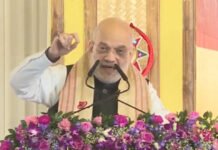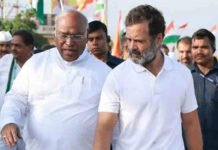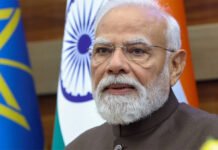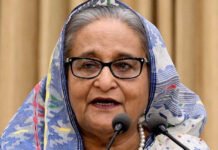Explore BJP’s comprehensive plan for the Jammu and Kashmir assembly elections, as political expert Neeraj Gupta analyzes Ram Madhav’s return, RSS involvement, and the party’s focus on national unity, development, and youth engagement.
Political landscape in Jammu and Kashmir
The political landscape in Jammu and Kashmir (J&K) is about to experience a seismic shift, as the Bharatiya Janata Party (BJP) gears up for the upcoming assembly elections with a meticulously crafted strategy. Political circles are buzzing with speculation and analysis, and at the center of this discourse is the return of Ram Madhav to the BJP fold—a move that, according to political expert Neeraj Gupta, symbolizes more than just the comeback of a seasoned leader. It marks the re-entry of the Rashtriya Swayamsevak Sangh (RSS) into the strategic framework of the BJP, particularly concerning J&K.
In this article, we’ll delve deep into the contours of BJP’s plan, the significance of Ram Madhav’s return, the role of RSS, and how the party intends to navigate the complex socio-political terrain of J&K. We’ll also explore the potential impact on the region’s youth, the significance of national unity as a campaign theme, and the challenges posed by opposition forces.
Ram Madhav’s Return: A Strategic Move or RSS’s Resurgence?
Ram Madhav’s reappointment as the election in-charge for J&K has sparked considerable debate. Some view it as a routine political maneuver, but Neeraj Gupta argues that it signifies much more. According to Gupta, this isn’t just Ram Madhav’s return—it’s the RSS’s calculated re-engagement with BJP’s J&K strategy.
The Seven-Hour Marathon: A Critical Turning Point
The decision to bring back Ram Madhav wasn’t made lightly. It followed a seven-hour marathon discussion at Rajnath Singh’s residence, where top leaders from both BJP and RSS deliberated on various issues, one of which was the future role of RSS in BJP’s strategic planning. What’s particularly noteworthy is that Amit Shah, the formidable Home Minister, had to make an appearance at this crucial meeting. This indicates the gravity of the decisions being made.
Why Ram Madhav?
Ram Madhav isn’t new to J&K. His previous stints have been marked by significant groundwork in the region, especially in aligning the party’s objectives with the aspirations of the local populace. His deep understanding of the region’s dynamics, coupled with his strong RSS background, makes him the ideal candidate to spearhead BJP’s campaign.
The Special Plan: BJP’s Blueprint for J&K Elections
With Ram Madhav at the helm, BJP’s strategy for the J&K assembly elections is a well-oiled machine, designed to address various challenges while capitalizing on the party’s strengths.
Slogan of National Unity: A Unifying Force
One of the central pillars of BJP’s campaign will be the slogan of national unity. In a region historically fraught with separatist sentiments, BJP is positioning itself as the party that stands for a united India, with J&K as an integral part of the nation.
Targeting Abdullah and Mehbooba: A Calculated Offensive
BJP’s plan isn’t just about promoting its own agenda; it’s also about discrediting its rivals. The party has set its sights on the two dominant political families in Kashmir—Farooq Abdullah and Mehbooba Mufti. By exposing corruption during their tenures and questioning their commitment to the region’s development, BJP aims to weaken their influence.
Contesting All Seats: A Bold Move
In a departure from its previous strategies, BJP has decided to contest all assembly seats in Kashmir. This move signifies the party’s confidence and its intention to establish a strong foothold in the Valley. BJP isn’t just contesting these elections; it’s making a statement that it’s here to stay.
New Faces, Youth Focus: A Fresh Approach
One of the standout features of BJP’s plan is its focus on youth. The party recognizes that the youth of J&K are at a crossroads, torn between the allure of militancy and the promise of development. By fielding new, youthful candidates, BJP hopes to resonate with this demographic and steer them away from the path of terrorism.
Development Post-Article 370: A Mixed Bag
The abrogation of Article 370 was a landmark moment in J&K’s history. BJP is expected to highlight the development work done since then, although the party is also aware that the pace of development hasn’t met all expectations. This issue will likely be a double-edged sword during the campaign.
RSS’s Role in Shaping BJP’s Future Strategies
The re-engagement of RSS in BJP’s J&K strategy isn’t just about the assembly elections—it’s about the long-term vision for the region.
The Ideological Backbone
RSS has always been the ideological backbone of BJP, providing the philosophical framework within which the party operates. In J&K, this means emphasizing the idea of a culturally and politically unified India, where J&K isn’t just a state but a symbol of the country’s integrity.
The RSS-BJP Dynamic
The seven-hour discussion that led to Ram Madhav’s return also addressed the broader role of RSS in shaping BJP’s future strategies. This isn’t just about J&K; it’s about ensuring that BJP’s policies align with RSS’s vision across the country.
What Does This Mean for J&K?
For J&K, this could mean a more aggressive push towards integrating the region with the rest of India, not just politically but culturally as well. This might involve promoting the use of Hindi, encouraging cultural exchanges, and fostering a sense of Indian identity among the region’s youth.
The Opposition’s Strategy: Cornering BJP on Development
While BJP has a clear plan, the opposition isn’t sitting idle. Parties like the National Conference and the People’s Democratic Party are expected to corner BJP on the issue of development, or the lack thereof, since the abrogation of Article 370.
The Development Debate
Opposition leaders are likely to highlight the gaps in infrastructure, healthcare, and employment, arguing that the removal of Article 370 hasn’t delivered the promised benefits. This could resonate with voters who feel that their lives haven’t improved despite the significant political changes.
The Corruption Angle
In response, BJP is expected to go on the offensive, exposing corruption during the tenures of Abdullah and Mufti. This could be a potent strategy, especially if BJP can present concrete evidence of malfeasance.
BJP’s Game Plan: Fielding Independent Candidates
An interesting facet of BJP’s strategy is its plan to support independent candidates in J&K. This approach serves multiple purposes.
Broadening the Base
By backing independent candidates who support Prime Minister Narendra Modi’s Kashmir agenda but prefer to maintain some distance from the party, BJP is broadening its base. This allows the party to appeal to a wider range of voters without diluting its core message.
Reducing Opposition Unity
Supporting independents could also help to fragment the opposition, making it harder for rival parties to present a united front against BJP. This could be particularly effective in a region like J&K, where political allegiances can be fluid.
The Road Ahead: A High-Stakes Election
As the election dates draw near, political activities in J&K are ramping up, with all eyes on BJP. The party’s top brass, including PM Modi, BJP President JP Nadda, Home Minister Amit Shah, and Defense Minister Rajnath Singh, are expected to play pivotal roles in the campaign.
A Referendum on Article 370?
For BJP, these elections could serve as a referendum on the decision to abrogate Article 370. The party will be keen to prove that the move was in the best interest of the region and that it has led to tangible benefits for the people of J&K.
The Role of Youth
With a focus on youth, BJP is hoping to channel the energy and aspirations of J&K’s younger generation. By offering them a stake in the region’s future, the party is attempting to create a new narrative—one that moves beyond the grievances of the past.
FAQs
Q: Why is Ram Madhav’s return significant for BJP’s J&K strategy?
A: Ram Madhav’s return is seen as a symbol of RSS’s re-engagement with BJP’s strategy for J&K, reflecting a more ideologically driven approach to the region’s elections.
Q: What will be BJP’s main campaign slogan in J&K?
A: BJP plans to campaign under the slogan of national unity, emphasizing J&K’s integral role in a united India.
Q: How is BJP addressing the issue of youth in J&K?
A: BJP is focusing on fielding new, young candidates and engaging with the youth to steer them away from militancy and towards development.
Q: What role will RSS play in BJP’s J&K strategy?
A: RSS is expected to play a significant role in shaping BJP’s long-term vision for J&K, promoting cultural and political integration with the rest of India.
Q: How will BJP counter the opposition’s criticism on development?
A: BJP is likely to counter by highlighting corruption during the previous regimes of Abdullah and Mufti, and by showcasing the development work that has been done since the abrogation of Article 370.
Conclusion
The upcoming assembly elections in Jammu and Kashmir are set to be a defining moment in the region’s political history. With a meticulously crafted strategy that includes the return of Ram Madhav, a focus on national unity, and a strong youth engagement plan, BJP is leaving no stone unturned in its quest to establish a firm foothold in the Valley.

















Good analysis